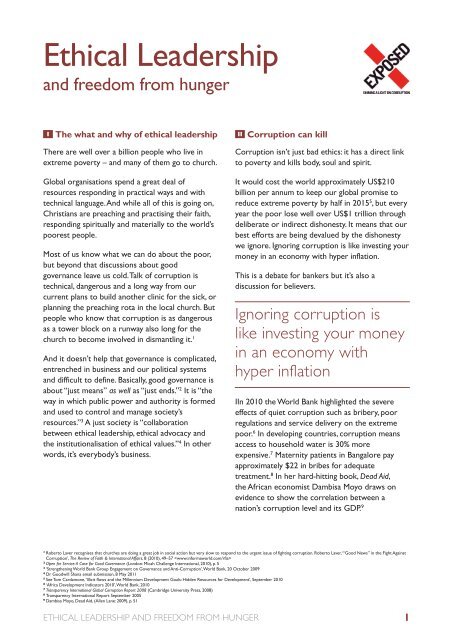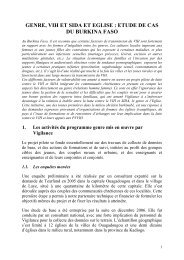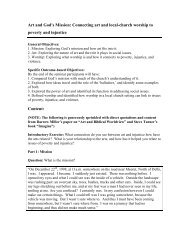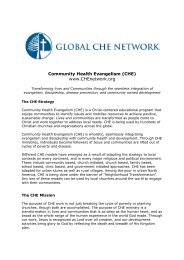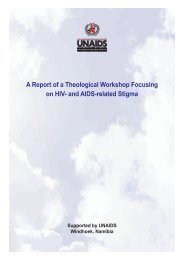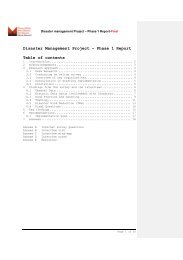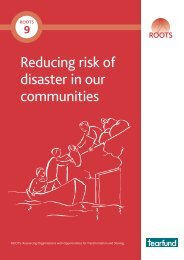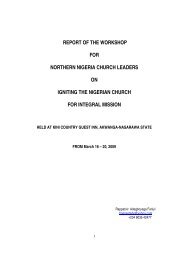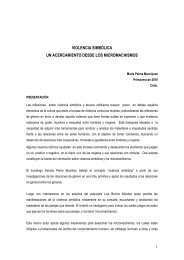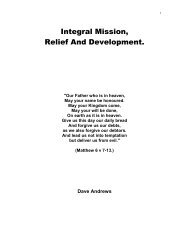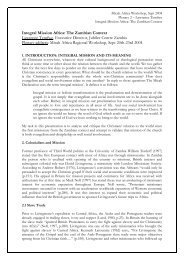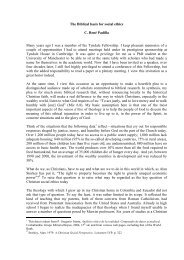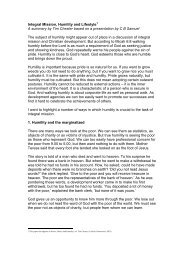Ethical Leadership
Ethical Leadership
Ethical Leadership
Create successful ePaper yourself
Turn your PDF publications into a flip-book with our unique Google optimized e-Paper software.
<strong>Ethical</strong> <strong>Leadership</strong>and freedom from hungerIThe what and why of ethical leadershipIICorruption can killThere are well over a billion people who live inextreme poverty – and many of them go to church.Global organisations spend a great deal ofresources responding in practical ways and withtechnical language. And while all of this is going on,Christians are preaching and practising their faith,responding spiritually and materially to the world’spoorest people.Most of us know what we can do about the poor,but beyond that discussions about goodgovernance leave us cold. Talk of corruption istechnical, dangerous and a long way from ourcurrent plans to build another clinic for the sick, orplanning the preaching rota in the local church. Butpeople who know that corruption is as dangerousas a tower block on a runway also long for thechurch to become involved in dismantling it. 1And it doesn’t help that governance is complicated,entrenched in business and our political systemsand difficult to define. Basically, good governance isabout “just means” as well as “just ends.” 2 It is “theway in which public power and authority is formedand used to control and manage society’sresources.” 3 A just society is “collaborationbetween ethical leadership, ethical advocacy andthe institutionalisation of ethical values.” 4 In otherwords, it’s everybody’s business.Corruption isn’t just bad ethics: it has a direct linkto poverty and kills body, soul and spirit.It would cost the world approximately US$210billion per annum to keep our global promise toreduce extreme poverty by half in 2015 5 , but everyyear the poor lose well over US$1 trillion throughdeliberate or indirect dishonesty. It means that ourbest efforts are being devalued by the dishonestywe ignore. Ignoring corruption is like investing yourmoney in an economy with hyper inflation.This is a debate for bankers but it’s also adiscussion for believers.Ignoring corruption islike investing your moneyin an economy withhyper inflationIIn 2010 the World Bank highlighted the severeeffects of quiet corruption such as bribery, poorregulations and service delivery on the extremepoor. 6 In developing countries, corruption meansaccess to household water is 30% moreexpensive. 7 Maternity patients in Bangalore payapproximately $22 in bribes for adequatetreatment. 8 In her hard-hitting book, Dead Aid,the African economist Dambisa Moyo draws onevidence to show the correlation between anation’s corruption level and its GDP. 91Roberto Laver recognises that churches are doing a great job in social action but very slow to respond to the urgent issue of fighting corruption. Roberto Laver, ‘“Good News” in the Fight AgainstCorruption’, The Review of Faith & International Affairs, 8 (2010), 49–57 2Open for Service: A Case for Good Governance (London: Micah Challenge International, 2010), p. 53‘Strengthening World Bank Group Engagement on Governance and Anti-Corruption’, World Bank, 20 October 20094Dr Goodwill Shana email submission, 8 May 20115See Tom Cardamone, ‘Illicit flows and the Millennium Development Goals: Hidden Resources for Development’, September 20106‘Africa Development Indicators 2010’, World Bank, 20107Transparency International Global Corruption Report 2008 (Cambridge University Press, 2008)8Transparency International Report September 20059Dambisa Moyo, Dead Aid, (Allen Lane: 2009), p. 51EthIcal lEadErshIp and frEEdom from hungEr 1
VA trinity of interventionThe pillars of corruption have to be dismantled. Wecan punch the walls but its far better to pull downthe pillars. And champions of freedom know that incomplicated situations we have to be selective inthe pillars we chose to shake.ChurchAs the Bible says, judgement begins with the houseof God. Our starting point should be a criticalreview of our attitudes towards justice and goodgovernment. 19 In this regard it’s worthremembering that the first controversy in the earlyChurch was not a Christological debate but aninjustice which the Church quickly resolved. 20Frankly, integrity will challenge the ChristianChurch even before we talk to anyone else. AChristian woman working in the World Bank waskeen to know that this was on the Church’s agendabecause she said that her pastor changed his jetplane every year but never talked about justice!Only a transformed Church is likely to be an agentof transformation. Light shines out best when ourwindows are clean.Integrity is a big question for people of all faiths,and the observation that very religious cultureshave a higher than normal corruption index appliesequally to Christian communities. 21 It’s a sadindictment that ecclesiastical crime hasmushroomed from an estimated US$300,000 in1900 to US$32billion in 2010 with predictions thatit will rise to US$60billion by 2025. 22 A finding likethis muzzles the gospel.The good news is that from education to health,anti-slavery, human trafficking and human rights,Christians have a positive history in defending thepoor. In India, the National United Christian Forumput out a statement against corruption (April2011), and following on from Lausanne 2010 agroup of Christians in India held a conferenceon corruption on 2 September 2011. And asBatchelor and Osei-Mensah point out, a great dealof African Christians are making serious attemptsto respond to corruption. 23It was particularly encouraging that the visionaryCape Town Commitment has identified corruptionas an important part of Christian discipleship:Corruption is condemned in the Bible. It undermineseconomic development, distorts fair decision-makingand destroys social cohesion. No nation is free ofcorruption. We invite Christians in the workplace,especially young entrepreneurs, to think creatively abouthow they can best stand against this scourge. 24Beyond these initiatives, Christians are involved instatutory organisations like the United Nations andTransparency International.BusinessChristian attitudes to the workplace have gonethrough a healthy revolution. Increasingly Christiansthink of the workplace as a setting for Christianwitness and influence. But very little thinking hasgone into how business reflects kingdom valuesabout transparent integrity in the workplace. 25Business has done a great deal to emancipatemillions of people in the so-called BRIC nations(Brazil, Russia, India and China). All of that is to becelebrated. But even good news can become asmoke screen for bad news. Wealth creation is nosubstitute for “honest scales”, for in all our wealthynations the gap between rich and poor is growing.Business, transnational agencies and corporationsbear a heavy responsibility for the shady businesspractices which continue to oppress the extremepoor. In the same way that businesses once grewwealthy on the backs of African slaves, somebusinesses today profit from the suffering of theextreme poor.There is a common misconception that corruptionis all about bad governments pillaging their nations.But, in fact, deliberate illicit flows account for 3–5%of the global loss of between $30–$50 billion eachyear. Half of this results from illicit cash flows ongoods and mispriced commodities. 2619See Rev Joel Edwards, ‘Goodness and Good Governance’ 20Acts 6:1–721Vinod Pavarala and Kanchan K. Malik, ‘Religions, Ethics and Attitudes towards Corruption: A Study of Perspectives in India’, Religions and Development Research Programme (2010) Working Paper 5322Todd M. Johnson, David B. Barrett, and Peter F.Crossing, ‘Status of Global Mission, 2010, in Context of 20th and 21st Centuries’, International Bulletin of Missionary Research, 34, no.1 (January 2010), p. 3423Paul Batchelor and Steve Osei-Mensah, ‘Salt and Light: Christians’ Role in Combating Corruption’, Cape Town 2010: The Third Lausanne Congress on World Evangelisation24‘The Cape Town Commitment: A Confession of Faith and a Call to Action’, Cape Town 2010: The Third Lausanne Congress on World Evangelisation, p.2625Ephesians 6:5–9; Colossians 3:22–2526Tom Cardamone, ‘Illicit flows and the Millennium Development Goals: Hidden Resources for Development’, September 2010EthIcal lEadErshIp and frEEdom from hungEr 3
As the current financial crisis reminds us, wealthcreation without justice still punishes the poor.Our purpose is not to demonise business. Rather itis to provide a prophetic appeal as powerful and asliberating as the prophets and Jesus himself. TheBible is overwhelming in its concern for impropertrading, and God’s concern for “honest scales”comes again and again in the Bible. 27the current financial crisisreminds us that wealthwithout justice stillpunishes the poorGovernmentThe mission to declare God’s goodness is integralto our mission in the world. This is the only way inwhich a just God can really be understood to begood in his own world. And it’s the only thingwhich makes sense of the proverb: “Honest scalesand balances belong to the LORD; all the weights inthe bag are of his making.” (Proverbs 16:11)As Christians we should not be selective in ouradvocacy. We have rightly lobbied about morality,family and the education of our children. We mustalso speak up for the poor.And we have no reason to believe that partnershipwith government for the common good goesagainst the grain of Scripture. Nehemiah’sreformation and restoration of Jerusalem wouldhave been inconceivable without help from a paganking. 28 Any Christian who is serious about the Bibleis obliged to be serious about biblical advocacy.God has left us with no mandate to be mute. 29 Andequally we must do more than pray for Christiansin government; we also need Christian leaders withthe passion and skills to shape our policies. AsGoodwill Shana puts it: “Christian politicians areover-rated if all they bring is integrity and ethics.They must create the socialisation andinstitutionalisation of ethical values and theinstitutional mechanism for good servicedelivery.” 30 This is precisely what Joseph, Estherand Daniel did.VIPutting God in good governanceThe need for good governance is presenteverywhere and in all societies. And this is preciselythe scope of the Church’s mission as salt and light.This kind of Christian witness will never displacethe powerful proclamation of freedom frompersonal sin and it will never allow our works toovershadow the work of the Cross. But it willdenounce the kind of sinfulness which crushes thepoor. And conversations and actions at the global,national and local level – however small – will be avital, missionary response to the pain of the world’spoorest people. Challenging corruption is morethan talk: it amplifies our good deeds by restrainingthe power of dishonest behaviour which preys onthe weak.For good governance is also good news to the poor.Rev Joel EdwardsSeptember 2011christian politicians areover-rated if all they bringis integrity and ethics.they must create themechanism for goodservice deliveryThis paper was written with support, insights andcontributions from:Dr Dewi HughesAmanda JacksonDr Denison JayasooriaCB SamuelDr Goodwill Shana27Tom Cardamone, ‘Illicit flows and the Millennium Development Goals: Hidden Resources for Development’, (September 2010)28Nehemiah 2:6–929See ‘Government, Global Poverty and God’s Mission in the World: An Evangelical Declaration’, Bread for the World, Wheaton College and Micah Challenge consultation, Wheaton College, Illinois, May 19, 2010.30Dr. Goodwill Shana email submission, 8 May 2011.EthIcal lEadErshIp and frEEdom from hungEr 4


